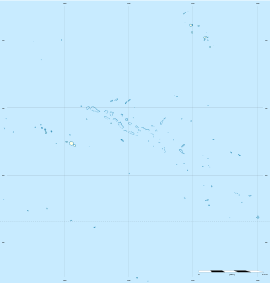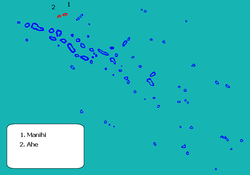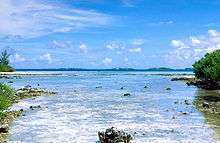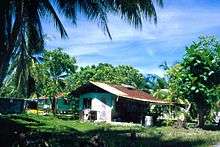Manihi
|
NASA picture of Manihi Atoll | |
 Manihi | |
| Geography | |
|---|---|
| Location | Pacific Ocean |
| Coordinates | 14°26′31″S 146°04′19″W / 14.44194°S 146.07194°W |
| Archipelago | Tuamotus |
| Area |
160 km2 (62 sq mi) (lagoon) 13 km2 (5 sq mi) (above water) |
| Length | 27 km (16.8 mi) |
| Width | 8 km (5 mi) |
| Highest elevation | 9 m (30 ft) |
| Highest point | (unnamed) |
| Administration | |
|
France | |
| Overseas collectivity | French Polynesia |
| Administrative subdivision | Tuamotus |
| Commune | Manihi |
| Largest settlement | Paeua |
| Demographics | |
| Population | 685[1] (2012) |
| Manihi | |
|---|---|
|
NASA picture of Manihi Atoll. | |
 | |
| Coordinates: 14°26′31″S 146°04′19″W / 14.442°S 146.072°WCoordinates: 14°26′31″S 146°04′19″W / 14.442°S 146.072°W | |
| Country | France |
| Overseas collectivity | French Polynesia |
| Government | |
| • Mayor (2008–2014) | Jeannot Mataoa |
| Area | 25 km2 (10 sq mi) |
| Population (2012)1 | 1,237 |
| • Density | 49/km2 (130/sq mi) |
| INSEE/Postal code | 98727 / 98771 |
| 1 Population without double counting: residents of multiple communes (e.g., students and military personnel) only counted once. | |
Manihi, or Paeua,[2] is a coral atoll in the Tuamotu Archipelago, part of French Polynesia. It is one of the northernmost of the Tuamotus, located in the King George subgroup. The closest land to Manihi is Ahe Atoll, located 14 km to the west. The total population is 685 inhabitants.
Geography

Manihi is a relatively large elongated atoll. Its oval-shaped lagoon measures 27 km in length and 8 km in width, and is ringed by innumerable islets. The lagoon is well-known among snorkelers for its beautiful and diverse marine fauna, including, among other species, the manta ray. There is only one pass to enter the lagoon, located close to the atoll's southern end. It is known as Passe de Tairapa. 14°27′31″S 146°03′40″W / 14.4585°S 146.0610°W
The chief village is Paeua. Another important village, Turipaoa, is located in the south-western part of the atoll, and is home to about 400 inhabitants. Several of the islands are inhabited, by populations ranging from single individuals to as many as 400.
Demographics
Change in population of Manihi atoll.
| 1977 | 1983 | 1988 | 1996 | 2002 | 2007 | 2012 | ||
|---|---|---|---|---|---|---|---|---|
| 192 | 313 | 429 | 769 | 789 | 816 | 685 | ||
| Sources ISPF,[3] Mairie de Manihi[4] * : estimation | ||||||||
History
There are two ancient Polynesian ceremonial platforms constructed of blocks of coral (marae in Tuamotuan) on Manihi. The first recorded Europeans to arrive to Manihi were Dutch explorers Jacob le Maire and Willem Schouten on their 1615–1616 Pacific journey. They called this atoll "Waterland Island". British explorer John Byron, who reached Manihi in June 1765, called the atoll "Prince of Wales Island".
Economy
Manihi Atoll is today home to a great number of pearl farms, and is the original home of the highly prized Polynesian black pearls.
There is now a five star resort on Manihi, called the Pearl Beach Manihi resort, which has overwater bungalows in the lagoon.
There is one airfield on the atoll, inaugurated in 1994: Manihi Airport. It is located close to Turipaoa and is served by the local airline Air Tahiti.
Administration

The atoll is the chef-lieu of the commune of Manihi which consists of the atolls of Manihi and Ahe. The current mayor of the commune is Jeannot Mataoa (mandate: 2008–2014).[5]
See also
References
- ↑ "Population". Institut de la statistique de la Polynésie française. Retrieved 6 October 2014.
- ↑ Young, J.L. (1899). "Names of the Paumotu Islands, with the old names so far as they are known.". Journal of the Polynesian Society. 8 (4): 264–268. Retrieved 7 January 2015.
- ↑ ISPF, Démographie
- ↑ Mairie de Manihi,
- ↑ Les Communes (in French) Publisher: Ministère du logement, de l'aménagement du Territoire de la Polynésie Française. Accessed 21 February 2010
External links
| Wikimedia Commons has media related to Manihi. |
| Wikivoyage has a travel guide for Manihi. |
- Atoll list (in French)
- Tuamotu Archipelago: Manihi at the Wayback Machine (archived December 23, 2010)
- le Maire & Schouten
- John Byron